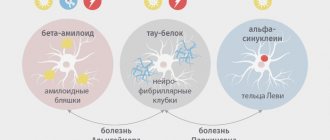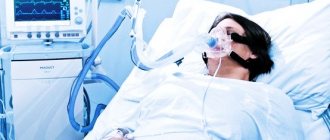Data
- Delirium tremens occurs in connection with the cessation of alcohol intake in alcoholics .
- Typically, an affected person will experience shaking , sweating , restlessness, confusion, seizures and hallucinations.
- Causes swelling of the brain, which is a life-threatening condition.
- Treated with large doses of sleeping pills.
- It is important to get enough B vitamins, as they prevent this process, and their deficiency leads to the development of Wernicke-Korsakoff syndrome.
What is delirium tremens: causes of occurrence
This form of mental disorder appears in a person 2-3 days after stopping the systematic intake of large amounts of alcohol. The disorder has dire consequences. Regular use causes addiction to the entire body, including the brain. When a person does not get his usual dose, the alcoholic's brain begins to protest. In the central nervous system, mechanisms that are responsible for excitation or inhibition are activated, and all this covers an avalanche of a person who has given up alcohol. The same applies to the problem of drug addiction.
Symptoms of delirium tremens
- Delirium usually occurs after particularly long and powerful binges.
- As a rule, delirium occurs 2-4 hours after you stop drinking. It begins with irritability, sleep disturbances, anxiety, and nightmares.
- Illusions and hallucinations arise. The patient will say that he sees insects or small animals. Sufferers are often terrified and can actually feel animals on their bodies. The person is disoriented in time, place and situation. He sweats , has palpitations , tremors , and sometimes has convulsions and epileptic seizures . The attacks themselves can be dangerous. In severe forms of delirium, circulatory problems and cardiac arrest may occur.
Alcoholic delirium - stages and symptoms
Alcoholic delirium is the same fever in scientific language. Translated literally from Latin as “shaking darkness.”
There are several main phases:
- the first is weak;
- the second is in full swing;
- the third - peak, is considered life-threatening for the patient.
The first stage can last from three to seven days. A person does not feel symptoms, but to an outside observer the signs are already visible. Then comes the next stage, in which all the patient’s senses are heightened, and reality merges with hallucinations. During this period, the patient becomes a follower. The last stage, the most dangerous, completes the process. The torment becomes unbearable, and to stop it, many are ready to commit suicide. Qualified specialists must be nearby throughout all periods; you cannot wait out delirium on your own at home - this is dangerous both for the life of the patient and for the lives of his loved ones.
If you are determined to cure an alcoholic, be sure to familiarize yourself with the symptoms of the disorder.
- The appearance of headache, vomiting, rapid heart rate and pulse, and impaired coordination of movements may indicate the onset of psychosis.
- Anxiety.
- Hallucinations. The person behaves strangely - sees frightening pictures, hears, and also feels tactilely non-existent. Doesn't recognize his family.
- The body temperature will rise, the condition will be accompanied by severe chills and tremors of the limbs. Convulsions are possible.
- Lack of sleep – the patient is physically unable to fall asleep, which aggravates the overall picture.
- Unnatural pale skin.
Dosage of drugs
- Intravenous administration and titration lead to the desired result.
- The dosage should be so that the patient sleeps.
- The required total dose of the drug may vary widely.
- Haloperidol or another antipsychotic may be indicated in exceptional cases, as an addition to benzodiazepines.
- Antipsychotics are recommended not only because they lower the seizure threshold, but because they mask withdrawal symptoms.
- Always thiamine (vitamin B1 = thiamine 25 mg/ml) during hospitalization to prevent encephalopathy. Thiamine 100-200 mg intravenously slowly, then 50-100 mg per day.
- Magnesium can be given to all patients with normal renal function.
- In severe forms of delirium tremens, temperature must be measured, pulse and blood pressure are recorded regularly due to the danger of hypotension and hyperthermia.
- Correction of electrolyte and water imbalances with the help of droppers every 7-8 hours.
Delirium tremens: when and how it occurs
It is noteworthy that, as a rule, it occurs during the withdrawal phase of use, and not during drinking. Imagine that a person has been drinking alcohol for months and years. And suddenly the body stops receiving its usual daily dose of alcohol. Changes in metabolic processes begin to form. The mechanisms responsible for excitability and inhibition grow in the central nervous system. Mental disorders appear that aggravate the withdrawal syndrome.
Many narcologists note the dependence of the frequency of delirium on the length of use, neurological and vegetative status. The longer a person drinks, the more likely it is that delirium tremens will develop. The chances of a “squirrel” appearing also increase when the elimination of withdrawal symptoms is started too late. Delirium often occurs after coming out of a long binge, characterized by massive alcohol intoxication. Sometimes, but extremely rarely, the “trigger” for it is a large dose of alcohol taken once.
Consequences of delirium tremens
Mortality rate is approximately 15%. But today this figure has dropped by several percent among patients seeking medical help. The real death toll, however, is likely slightly higher as not all people were hospitalized.
Most alcoholic delirium is a short-term condition. More than 80% goes away within three days if treated correctly. Some may have symptoms for a longer period of time. In very rare cases, symptoms may last for 4-5 weeks.
More than a third of people who experience delirium tremens will be dead within 8 years from alcohol-related illnesses or accidents.
General clinical picture of delirium tremens
Before the onset of the main psychosis, the appearance of precursors is characteristic, arising from a sudden refusal of alcohol. Its signs are:
- Nausea, vomiting and intense headache.
- Impaired functioning of the musculoskeletal system (retardation of movements, lack of coordination, etc.).
- Incoherent speech.
- Seizures (about 11%).
All signs of delirium tremens can be called two types: psychological and somatic. Determining its beginning is quite simple. Such individuals are diagnosed with visual hallucinations. Most often they see animals, insects and various entities. Such visions are very realistic, so patients can not only see a clear image, but also hear sounds (auditory glitches) or smell. This condition is extremely dangerous, since a person is not aware of his actions and is not able to sensibly assess what is happening around him. The condition of patients may be complicated by the sensation of touching (tactile hallucinations) or jolts.
Most people develop a mental disorder such as chronic insomnia. Sleep disturbance persists for several days. In addition, the following mental disorders occur:
- Disorientation in space and self.
- Anxiety syndrome (increased arousal, feeling of fear).
- Panic attacks.
In the first days, somatic symptoms are diagnosed. Characterized by increased blood pressure and body temperature, increased heart rate, tremor of the upper extremities, and sweating. Due to intense headaches, vomiting is possible, and the skin becomes red. Binges lead to disruption of water-salt balance and metabolism, which never occurs in a healthy body.
The presence of large amounts of ethanol in the bloodstream leads to irreversible imitation of the heart, kidneys, liver and other internal organs. Patients suffer from organ failure, which can result in death. Therefore, it is necessary to provide emergency medical care as quickly as possible. To do this, just contact our specialists, who will come out to treat delirium tremens at home or transport you to a hospital.
According to statistics from narcologists, many more men suffer from this disease (about 90% of all cases). There is no specific explanation for these data, but many doctors believe that this is due to the fact that the male half of humanity more often goes on a protracted binge. White fever can develop in women even 3-4 years after continuous abuse of alcoholic beverages. This is due to fewer enzymes responsible for the breakdown of ethanol.
Despite the difference in prevalence, the symptoms of the pathology are similar in both sexes. The only difference is that in women the abortive nature of the hallucinatory syndrome predominates. It is characterized by less clouding of the mind, and visual and auditory illusions are not combined with loss of orientation in time. The deterioration lasts 2-3 hours a day, after which a temporary “lull” occurs.
How to avoid this condition
When an alcoholic stops drinking, it is very important that any withdrawal symptoms are treated with certain types of anti-anxiety medications. Partly to mitigate this period of time for the sufferer, but also to prevent brain damage that could eventually pave the way for delirium tremens.
A healthy diet, vitamins and minerals are probably also important. However, patients simply do not comply with these recommendations.
At the first manifestations of delirium tremens, consult a narcologist . He has cleansed the body after binge drinking and will select a further treatment regimen and coding .
Advantages of treating delirium tremens in a clinic
Alcohol addiction is a formidable problem that is almost impossible to cope with on your own. It brings suffering not only to the life of the addicted person, but also to his family or friends. A delirious state is the inevitable end of many years of “drunkenness,” but even this fact will not help prepare for it and take the necessary measures to save it in a timely manner. Some third-party intervention can only aggravate the situation, so the best solution for delirium tremens would be to call the medical team at our drug treatment psychiatric clinic.
Specialists will arrive at the specified address as quickly as possible and provide emergency assistance even at home. If there are indications or the client’s personal desire, it is possible to transport him to a hospital for a more detailed diagnostic study and prescribe long-term therapy (both within the drug treatment facility and after discharge). Here the patient is under the close and round-the-clock supervision of medical workers who provide moral support, control the intake of prescribed medications and prevent any breakdowns.
A mandatory component of achieving the desired result is working with a psychologist. After recovery from delirium, the person attends psychotherapy sessions. It is aimed at achieving sobriety and lifelong abstinence from alcohol. Thanks to this, the client's existence is not limited to the need to obtain a response to a new dose. He becomes interested in getting a new job, restoring relationships with his family and rehabilitating his own social status.
Other forms of fever
There are two groups of forms of delirium: with a favorable course (reduced) and severe.
The first group includes cases in which only part of the symptoms of the classic clinical picture are present.
- Hypnagogic - accompanied by visual hallucinations only when falling asleep and closing the eyes.
- Hypnagogic with fantastic content – characterized by more vivid and realistic hallucinations. A person sees images when he closes his eyes; when he opens them, he returns to reality again.
- Abortive - begins suddenly, but does not develop until stages II and III. The patient may see isolated visual hallucinations, hear non-existent calls, etc.
Some patients experience atypical forms: the attack is associated with withdrawal symptoms after drinking alcohol, but the clinical manifestations are more reminiscent of schizophrenia. This usually occurs with repeated episodes.
Severe forms, on the contrary, have a malignant course and often end in death. Psychiatrists distinguish two types, but they usually occur together: the first type smoothly transitions into the second.
- Professional – so named because of the monotonous repetition of actions that one performs in everyday life: from typing on a keyboard to driving a car or combing one’s hair. Hallucinations and delusions are mild and usually absent, while the person is agitated and silent. There are no episodes of improvement in well-being.
- Mustering - proceeds rapidly, without hallucinations and delusions, but with deep confusion of consciousness, a grasping reflex and muttering of individual words or syllables.
Without medical help , the prognosis is unfavorable, the condition ends in death in 10% of cases, or severe complications after recovery, but sometimes psychosis can be treated with medication without consequences for health.
Treatment and prevention
Treatment of patients in a state of alcoholic delirium is carried out by a psychiatrist-narcologist.
A standard treatment plan includes:
- stabilization of the condition, which will not allow complications to develop;
- detoxification, which removes ethanol residues and breakdown products from the blood, which can cause side effects in combination with prescribed medications;
- relief of withdrawal syndrome with medication;
- supportive treatment and psychotherapy.
An important task is to normalize sleep, since after waking up the symptoms of delirium decrease or disappear.
The condition lasts about 6-7 days, during which the person must be under constant medical supervision in the intensive care unit.
There is only one way to prevent the development of delirium tremens: by completely abstaining from drinking any alcoholic beverages. Alcohol is never harmless or beneficial; it always has a bad effect on the nervous system, internal organs and metabolic processes, and provokes addiction in all people who drink a lot and often.
Complete abstinence from alcohol is relevant for people in the “risk group” who are more likely to encounter fever:
- diseases of the central nervous system;
- vascular pathologies;
- traumatic brain injuries;
- a previous history of delirium.
A complication occurs during withdrawal syndrome not only in binge alcoholics, but also during a relapse after many years of remission. Therefore, former addicts should be regularly observed by a narcologist, turning to him at the first sign of craving for alcohol.
Reasons for the development of alcoholic delirium
The cause of alcoholic delirium (“delirium tremens”) is the same as the cause of withdrawal syndrome in alcoholism – a pronounced imbalance of neurotransmitters in the neurons of the brain:
- deficiency of the inhibitory neurotransmitter gamma-aminobutyric acid (GABA - without it it is impossible to calm down, relax, fall asleep, normalize heart rate and blood pressure);
- an excess of the excitatory neurotransmitter glutamate (note - not to be confused with the food additive monosodium glutamate), which causes overexcitation of neurons and, as a result, disruption of the nervous system, fear, anxiety, complete lack of sleep, tachycardia with extrasystole, spasms blood vessels, increases blood pressure to a stroke level .
Metabolic imbalance aggravates vitamin B1 deficiency, which occurs in all alcoholics after heavy drinking, since as a result of heavy drinking, the intestinal flora and processes of absorption of vitamins in the intestines are disrupted.
Vitamin B1 ensures the stability of nerve cell membranes. With its deficiency, nerve cells become highly sensitive to toxic influences, and during binge drinking they are exposed to the powerful toxic effects of ethyl alcohol and its metabolite acetaldehyde. The longer the binge, the greater the number of neurons that die as a result of intoxication, the higher the likelihood of alcoholic delirium.
The imbalance of neurotransmitters in the brain of an alcoholic cannot be adjusted by willpower; it does not go away as he sobers up, it gets worse with every hour of not drinking alcohol; an alcohol drip and “cleansing” the body in this state will also not help.
What to do if your friend or relative has signs of developing alcoholic psychosis (delirium tremens)? How to deal with this condition?
Call a specialist to your home
“Who should I call if a person has alcoholic psychosis?” – people often ask when faced with an unpleasant situation for the first time. The answer is simple: the doctors of the Narkozdrav clinic, because only they know what to do in case of alcoholic psychosis. Although the team arrives within minutes of the call, it is useful to know what to do if delirium occurs. If possible, the patient's body is placed on the bed in a horizontal position, in severe cases even tied down. Next, they turn to specialists who provide assistance for delirium tremens and wait for the arrival of doctors.
First aid for those suffering from delirium is to lower intracranial pressure and eliminate unhealthy agitation. Most often, tranquilizers administered in large doses are used for this purpose. Toxins are removed using droppers, and medications are added to the solution to stimulate the work of the heart muscle.










